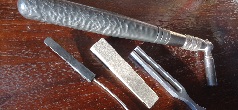My Philosophy

I am proud to share my work with beginner piano players allowing them to benefit from a professional tuning and improve their playing.

1- Psycho-physiological Aspects of Piano Tuning Perception
Published in the Europiano magazine in Jan-Feb 2013
![]() Aspects of Piano Tuning Perception (PDF Version)
Aspects of Piano Tuning Perception (PDF Version)
“Ask one of 100 pianists about what they feel after a good tuning of their piano and they’ll answer: easier playing, plays by itself, weightless keyboard, etc.”
2-Virus Tuning
" The title of this article came to being not as an echo of the past pandemic, but rather as a consequence of the acknowledgement of the traceable tendency of standardization of the level of modern tuning of pianos. This article asks, are pianos really sounding great today, as they should be sounding?"
You can read the article here as well.3-Piano Tuning in a church
This article is about my experience tuning in a church.
You can read the article here.
I am proud to share my work with beginner piano players allowing them to benefit from a professional tuning and improve their playing.